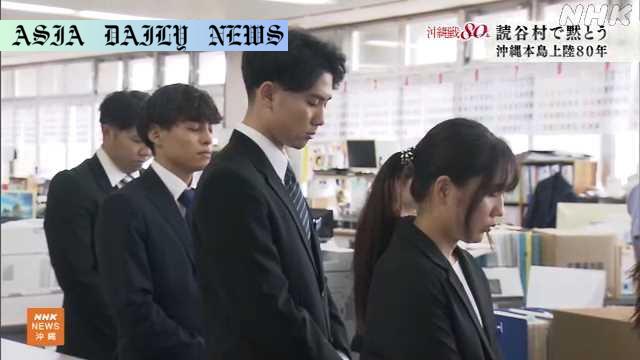Okinawa – A solemn ceremony in Yomitan village honors war victims, urging peace and remembrance of those lost 80 years ago.
In 1945, US troops landed on Okinawa during WWII, resulting in 200,000 deaths.
Yomitan village holds an annual moment of silence on April 1 to honor the victims.
Village leaders emphasize the importance of remembering history and praying for peace.

The Historical Context of the Battle of Okinawa
The Battle of Okinawa, often referred to as the “Typhoon of Steel,” remains one of the most brutal and devastating campaigns of World War II. On April 1, 1945, U.S. troops landed on the main island of Okinawa as part of a strategy to advance further into Japanese territory. What followed were months of relentless combat, leading to catastrophic losses on both sides. Over 200,000 lives were claimed during the battle, including soldiers and civilians. Notably, one out of every four Okinawan residents was killed, showcasing the horrifying toll of war on the local population.
The scars of this conflict can still be felt in Okinawa today, where memories of the brutalities endured underlie a collective desire for peace. The island, strategically located in Japan’s southwest, became a stage for one of the bloodiest conflicts in history, leaving behind a legacy that is deeply rooted in its people’s consciousness.
Yomitan Village: A Place of Reflection and Remembrance
Yomitan Village, situated in the central part of Okinawa’s main island, holds a special significance in commemorating the victims of the battle. This area, where U.S. soldiers initially landed, has become a focal point for annual observances that emphasize remembrance, education, and peace. Every April 1, villagers and local leaders gather for a moment of silence in honor of those who lost their lives during the war.
This year, the solemn occasion was marked by an announcement from Mayor Ishimine Denjitsu, who urged locals to reflect on the past and pledge a commitment to eternal peace. Understanding the tragic consequences of warfare is vital not only for honoring the memories of the departed but also for preventing history from repeating itself. By keeping the story alive, these ceremonies ensure that the lessons of Okinawa’s suffering continue to resonate across generations.
The Broader Implications of Remembering History
Beyond its local significance, the remembrance in Okinawa serves as a poignant reminder of the global consequences of war. It highlights the importance of peace-building efforts and the necessity of educating future generations about the cost of conflict. As the world grows increasingly interconnected, events like the Battle of Okinawa underscore the universal need for understanding, tolerance, and reconciliation.
By offering moments for reflection and dialogue, Yomitan’s annual ceremony plays a crucial role in fostering a culture of peace. The messages of Mayor Ishimine and other leaders resonate beyond their village, reminding us of our collective responsibility to work towards a world where such tragedies become a thing of the past.



Commentary
Okinawa’s Heartfelt Message to the World
Observing commemorations like the one in Yomitan Village conveys more than just a tribute to history—it reflects humanity’s unwavering pursuit of peace. The sheer scale of the tragedy associated with Okinawa’s past serves as a clarion call, urging us to reflect deeply on the true cost of war. As we approach the 80th anniversary of these devastating events, the importance of remembering cannot be overstated.
In many ways, Okinawa’s remembrance ceremonies are profound lessons for the world. The emotions of loss and resilience emanating from the participants remind us that behind statistics are personal stories, families torn apart, and generations forever affected. By honoring the legacy of those who lived through the harrowing experiences of the Battle of Okinawa, we keep their memories alive and invest in shaping a world where such horrors are less likely to recur.
The Essence of Peace Through Reflection
Mayor Ishimine’s address highlights a universal sentiment—peace is not to be taken for granted. The moment of silence observed every April 1st reflects a conscious effort to anchor Okinawa’s community in its past while striving for a hopeful future. It challenges us all to consider how actions taken today affect generations to come.
As we study how Yomitan Village keeps history alive, it becomes evident that commemorations like these go beyond ceremonies to form a part of civic identity. They remind us that the pursuit of peace isn’t just a diplomatic or political goal but a personal and societal responsibility. Okinawa’s resilient spirit urges others to incorporate remembrance and reflection into their collective consciousness, seeking a better future for humanity as a whole.